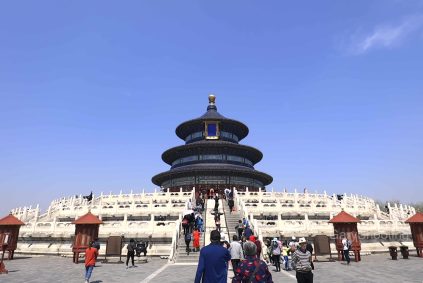Compreendendo as opções de passe de um dia para o metrô de Pequim: Estrutura de custos e detalhes de cobertura
Navegar pela extensa rede de metrô de Pequim torna-se mais conveniente com opções de passes de um dia projetadas para viajantes de curta duração. Esses passes permitem viagens ilimitadas dentro de um período especificado, eliminando a necessidade de comprar bilhetes individuais para cada viagem. No entanto, compreender suas estruturas de taxas e limites operacionais garante que os viajantes maximizem o valor, evitando confusão. Aqui está uma análise dos principais aspectos a serem considerados ao avaliar os passes diários do metrô de Pequim.
Elegibilidade e canais de compra para passes diários
O sistema de metrô de Pequim normalmente oferece passes de um dia para atender turistas e visitantes de curta duração, embora a disponibilidade possa variar com base nas políticas locais ou ajustes sazonais. Esses passes são frequentemente vendidos em balcões designados nas principais estações ou através de máquinas de venda automática que suportam dinheiro ou métodos de pagamento móvel.. Algumas estações perto de centros turísticos, aeroportos, ou os terminais de trem podem priorizar o estoque desses passes para atender à demanda dos visitantes. Para confirmar a elegibilidade, os viajantes devem verificar se há anúncios nas entradas da estação ou consultar a equipe, já que certos passes podem exigir prova de residência temporária ou itinerários de viagem. Adicionalmente, passes adquiridos para crianças ou idosos podem seguir regras diferentes, portanto, verificar as restrições de idade com antecedência evita problemas durante o uso.
Horário de funcionamento e períodos de validade
Os passes de um dia geralmente são ativados na primeira utilização e permanecem válidos por 24 horas consecutivas, cobrindo todas as operações do metrô durante essa janela. Isso inclui inícios de manhã cedo e serviços noturnos, garantir o acesso às atrações independentemente do horário de funcionamento. No entanto, passes não se estendem a ônibus, Táxis, ou outros modos de transporte público, limitando o seu âmbito apenas às linhas subterrâneas. Viajantes planejando viagens intermodais (por exemplo, metrô combinado com ônibus) deve levar em conta custos adicionais para outros métodos de transporte. Alguns passes também podem excluir linhas expressas do aeroporto ou extensões recém-inauguradas até a integração no sistema tarifário principal, portanto, a revisão de mapas de rotas ou avisos de estação esclarece lacunas de cobertura. Viajantes sensíveis ao tempo devem observar que os passes expiram no horário exato de ativação no dia seguinte, independentemente de quando ocorre o último passeio.
Cobertura geográfica e acessibilidade da rede
A rede de metrô de Pequim abrange 20 linhas, conectando distritos centrais com áreas suburbanas e marcos importantes como a Cidade Proibida, Templo do Céu, e Parque Olímpico. Um passe de um dia concede acesso a todas as estações operacionais desta rede, permitindo transferências contínuas entre linhas sem recalcular tarifas. Isto é particularmente vantajoso para turistas que pretendem visitar vários locais num único dia., pois reduz o tempo de transação nas máquinas de bilhetes. No entanto, os passes não cobrem serviços ferroviários intermunicipais ou trens regionais que partem de estações suburbanas, mesmo que essas estações façam parte do mapa do metrô. Os viajantes também devem confirmar se os trechos em construção ou os fechamentos temporários afetam suas rotas planejadas., pois desvios ou estações alternativas podem ser necessários apesar da validade do passe.
Regras e restrições de uso
Cada passe de um dia normalmente é limitado a um único usuário e não pode ser compartilhado entre viajantes. Na entrada e saída, os passageiros devem tocar o passe em leitores designados para validar as viagens e evitar multas. Os passes perdidos ou danificados geralmente não são reembolsáveis, portanto, é aconselhável protegê-los em um bolso ou bolsa segura. Alguns passes podem incluir uma taxa de depósito, reembolsável na devolução se não for utilizado, embora esta prática seja menos comum para opções diárias. Durante horários de pico ou grandes eventos, estações podem impor medidas de controle de multidões, mas os titulares de passes mantêm a mesma prioridade que os usuários regulares de ingressos. Os viajantes também devem guardar seus passes até sair da estação final, uma vez que os inspetores podem solicitar verificação durante verificações aleatórias.
Comparando passes diários com métodos de pagamento alternativos
Para viajantes que ficam mais de um dia, cartões de transporte recarregáveis ou aplicativos de pagamento móvel como Alipay ou WeChat Pay oferecem flexibilidade sem limites diários. Esses métodos calculam as tarifas com base na distância percorrida, o que pode ser econômico para passageiros pouco frequentes ou para aqueles que permanecem em uma área. No entanto, os passes de um dia continuam sendo ideais para visitantes que cobrem áreas extensas, pois eliminam a necessidade de rastrear custos de viagens individuais ou recarregar saldos repetidamente. Alguns viajantes combinam passes com viagens ocasionais de táxi por conveniência, usando o metrô para trechos de longa distância e táxis para conectividade de última milha. Avaliar itinerários diários ajuda a determinar se um passe está alinhado com os padrões de viagem ou se métodos de pagamento alternativos são mais adequados.
Ao analisar esses fatores, os visitantes de Pequim podem decidir se um passe de metrô de um dia está alinhado com seus planos de exploração. Os passes oferecem uma maneira descomplicada de conhecer a rede subterrânea da cidade, mas a consciência de suas limitações garante viagens tranquilas e eficientes.
















